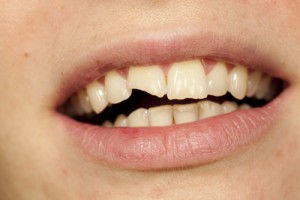Chipped teeth are more than an aesthetic issue. Depending on the severity of the breakage, a chip may lead to eating difficulties, pain, or infection. Read on to find out what to do for a chipped tooth.
How Do Teeth Become Chipped?
Enamel—the outer layer of the tooth—is hard yet brittle, and a force applied from a certain angle can cause the enamel to break free. The vulnerable front teeth can be damaged by falls, objects hitting the face, and other types of facial trauma. Chipping of the back teeth is more often caused by biting down on a hard food.
Teeth Emergencies: Handling Chips
If a chip has just occurred, try to find the missing piece, as a dentist or dental specialist may be able to bond it back in place. Rinse your mouth out with saline. Place the chip in your mouth and hold it there—either between your cheek and lower jaw or under your tongue—so that it stays moist and viable. If the sharp edge of the remaining tooth irritates the soft tissues inside your mouth, cover it with a small piece of sugarless gum or plain wax.
Fixes for Chipped Teeth
- The easiest remedy for a chipped tooth is bonding. As mentioned, the actual tooth piece can be re-placed in some cases. For other patients, an artificial bonding material may be used to fill in the missing tooth.
- Porcelain veneers are another option.
- Caps and crowns are the typical corrections for more severely chipped teeth.
Always consult a dentist immediately about a chipped tooth. Even a minor chip may cause damage to the middle and inner layers of a tooth. When you enroll in EDP Dental Plan, you’ll be well prepared for those dental emergencies. EDP offers significant savings on both regular and specialty dental care. Call 631-272-5230 or choose a plan and sign up online.







